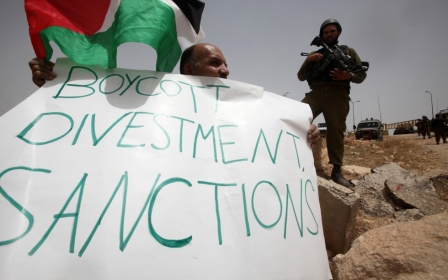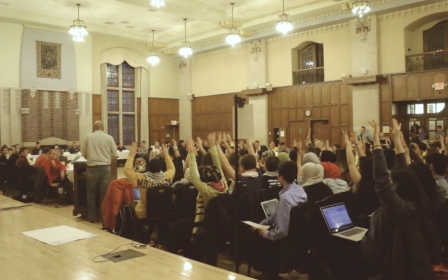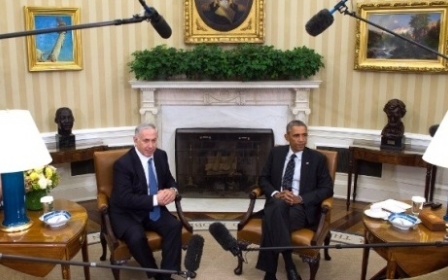Is Egypt ready for a BDS movement?

CAIRO - Chants in support of the Palestinian cause punctuated every part of the official BDS Egypt launch conference that took place on 20 April at the Syndicate of Journalists in Cairo:
"The cause is the same one, the cause is the Palestinian one."
"Oh Palestinian, oh Palestinian, your blood is my blood and your religion is my religion."
"We’ll repeat it, generation after generation, we’ve made an enemy out of you, Israel."
Perhaps translations do not do them justice, yet the original Arabic chants are not new to the majority of Arab ears. This kind of rhetoric has been heard in Egypt since the time of president Gamal Abdel Nasser, the father of Arab nationalism.
Almost 40 years have passed since the Camp David Accords were signed between Anwar Sadat and Menachem Begin, effectively ending the Egyptian-Israeli struggle and ushering in decades of a so-called peace process.
While this is not the first time in recent Egyptian history that a movement calling for a boycott of Israel has taken place, the Egyptian Boycott, Divestment and Sanctions (BDS) Movement launches in the spirit of its global BDS brethren around the world - from Canada to South Africa, Jordan to Australia. Answering the 2005 call of 170 Palestinian civil organisations, BDS Egypt is formed of 11 political parties, four revolutionary movements, six unions and six student movements, with the aim of empowering and enabling Egyptian individuals to boycott on a large scale directly.
The conference served as an important launch event for the BDS Egypt Movement, where the group was able to outline its manifesto, display the support it has received thus far from other parties and movements, and explain its next steps - mainly an upcoming boycott campaign to be announced in the coming weeks. Attended by many media outlets and journalists, speakers at the conference emphasised not only how they will be working to economically harm Israeli companies, but also what they will be doing in support of the Palestinian cause.
Elevation versus repression
Egypt is the fifth country in the Arab region to establish an official BDS movement, following Jordan, Morocco, Qatar and Kuwait. However, the long and arduous history between Egypt and Israel does not clearly identify a predictable outcome. The current political and security instability in Egypt since the 2011 uprising throws into light some questions: Can Egypt afford a movement based on an economic process that could result in more harm to Egypt than benefit? Does the current Egyptian social and political framework lend itself to an effective boycott of Israel?
Perhaps the most debilitating factor in Egyptian politics right now is the strength of the political polarisation in Egypt. Can socialists, Islamists, nationalists and liberals get together around one cause? And is there a need for something like that in a democratic society?
According to Ramy Shaath, a founding member of BDS Egypt, the movement was able to face this challenge by bringing together some of the different movements present, somewhat across the polarisation chasm. “The [BDS Egypt] coalition brought together leftists, socialists, revolutionary socialists, radical revolutionaries, Islamic movements, unions and student movements,” Shaath told Middle East Eye.
But what about the multitude of other political ideas that have a stronghold in Egypt? Indeed, it seems that with the exception of the Islamist groups, the BDS Egypt coalition was able to bring together only those already on the same side of the political spectrum.
Youssef El Chazli, a visiting scholar at Columbia University, explains: “In the way that the campaign has been conducted so far, it could be an interesting place for many disenfranchised activists, with the will to resume political action despite the closing of the political space in the past year and half, to convert their know-how and will into action. In the past, the ‘Palestinian cause’ was a good place to federate groups and individuals with sometimes (if not often) contradictory political views.”
While the BDS Egypt Movement is playing on the historical Arab consciousness towards the Palestinian cause, the larger context of a lack of democratic process in Egypt results in an entangled and confusing situation.
Between war and peace
Attempting to unpack this context, we run up against the strong ideological differences between the parties and movements in Egypt that could produce a continuation of the current polarisation. One of those main differences is the process by which nations move from war to peace. This paradigm is not as clear-cut as it may seem.
Shaath said that the BDS Movement is indeed in support of national security and strategic concerns. “In politics, there are hundreds of steps to address issues of national security and foreign policy without reaching a war and without giving up your strategic concerns,” he told MEE.
“We are not asking for Egypt to enter a war with Israel. We know that we are not capable of such a thing; our military is not capable of such a thing, and our economic situation does not allow it. But we are trying to re-establish the idea that Israel is the real danger, that we are doing things publicly and peacefully within a framework of international law.”
The war and peace paradigm may be seen as either a series of steps going from one to the other, or two sides of the same coin, and this is precisely where the right-wing parties differ with Shaath’s ideas. According to Bakly: “We can either use the peace process to pressure Israel into sitting at the negotiating table, or we can resort to armed conflict with Israel and the idea of the need to liberate Palestine, and throw away all the progress we’ve made in terms of agreements and treaties. We cannot fight the whole world to liberate Palestine.”
Sixty-seven years since the creation of the State of Israel has not only produced a well-established state that is recognised by the majority of the world, but that state has also increasingly disenfranchised the Palestinian people, and increasingly pushed the idea of an independent Palestine into the realm of utopian dreams.
Contradictory rhetoric
Since the signing of the Camp David Accords, there has been a vague dual rhetoric from the Egyptian government to its people about its position on Israel. On one hand, there is the official peace treaty and binding military and security cooperation. On the other hand, there is a constant negative public discourse encouraging the boycott of Israel and refusing a naturalised relationship with it. This is not only a contradictory rhetoric but one that points to the ongoing repression of the Egyptian society.
Additionally, this is one of the main reasons that liberal activists and parties in Egypt have refused to join the movement. Amr Bakly, a liberal democracy and peace activist, told MEE that the motives of the BDS campaign were in line with the current repressive government in Egypt. He said the reason there has not been an effort by the government to even stall this movement is due to the fact that it legitimises “the government’s main speaking point about being the keepers of peace and stability in the region, and that getting rid of the current rule would mean getting rid of peace and stability in the Middle East”.
As El Chazli points out, “The Egyptian state has always played on the ambivalence of its relationship to Israel, legally bound by a peace treaty (also bound by relations with the US) but [at] the same [time] using a nationalistic anti-Israeli rhetoric when needed.”
The differentiation between those in power and those who are not further complicates the framework within which the BDS Egypt Movement is being launched. On which side does this social movement add the most benefit?
“This social movement is in support of this contradictory position of the government, and it is therefore supporting this idea by the government: that we need to cut ties with Israel and we need to maintain this cold peace, and that we need to keep the relationship to governmental cooperation only, not social cooperation,” Bakly told MEE.
Removing the power from society to decide on the form of cooperation it wants with another state, if any, is against the democratic rule to which the Egyptian government supposedly conforms. The patriarchal and condescending rhetoric works in favour of legitimising the fear and insecurity doled out to the Egyptian public to encourage military rule and repression.
Back to basics
The underlying purpose of the global BDS movement, and by extension the BDS Egypt Movement, is to return dignity to the Palestinian people through economic and cultural isolation, pressuring Israel to conform to international law. This in itself is an important and worthy purpose.
However, the current framework of elevation or repression, the paradigm of war and peace, and the contradictory rhetoric in Egypt all do not lend a strong foundation on which to build yet another social movement which does not have a clear political and foreign policy.
Do we as Arabs yet again abandon the Palestinian people, as we have been doing for decades? Do we solely look after our own societal and ideological interests? Can there be other forms of returning the dignity required for the Palestinian people while still working on elevating pressure on Israel to cease its inhumane and internationally illegal procedures?
While working outside of Israel, many movements, unions, churches and individuals have taken up the peaceful and conscientious weapon of economic, social and cultural boycotts. However, one form of working from within the state of Israel has not been fully approached by Arab states, due to both social condemnation as well as the lack of political will: to work actively with peace activists within Israel who support and push forward Arab and human rights.
As opposed to increasing the extremism on both sides of the argument, there is a real need to approach the issue from a perspective of peaceful cooperation with Israeli activists who are not only interested in the average Egyptian but also hope to increase the space for dialogue to forge a way forward.
The Egyptian government has officially chosen the peace process and the average Egyptian citizen knows that we are unable to choose any other process due to a weakened economic and security situation. If individuals want to contribute to the Palestinian cause, let it be through direct support of the Palestinian people and through work with allies within Israel. This is a long road, but if dignity and humanistic ethics are involved, real and compassionate democracy and cooperation could flourish in Palestine, Israel and Egypt.
New MEE newsletter: Jerusalem Dispatch
Sign up to get the latest insights and analysis on Israel-Palestine, alongside Turkey Unpacked and other MEE newsletters
Middle East Eye delivers independent and unrivalled coverage and analysis of the Middle East, North Africa and beyond. To learn more about republishing this content and the associated fees, please fill out this form. More about MEE can be found here.




